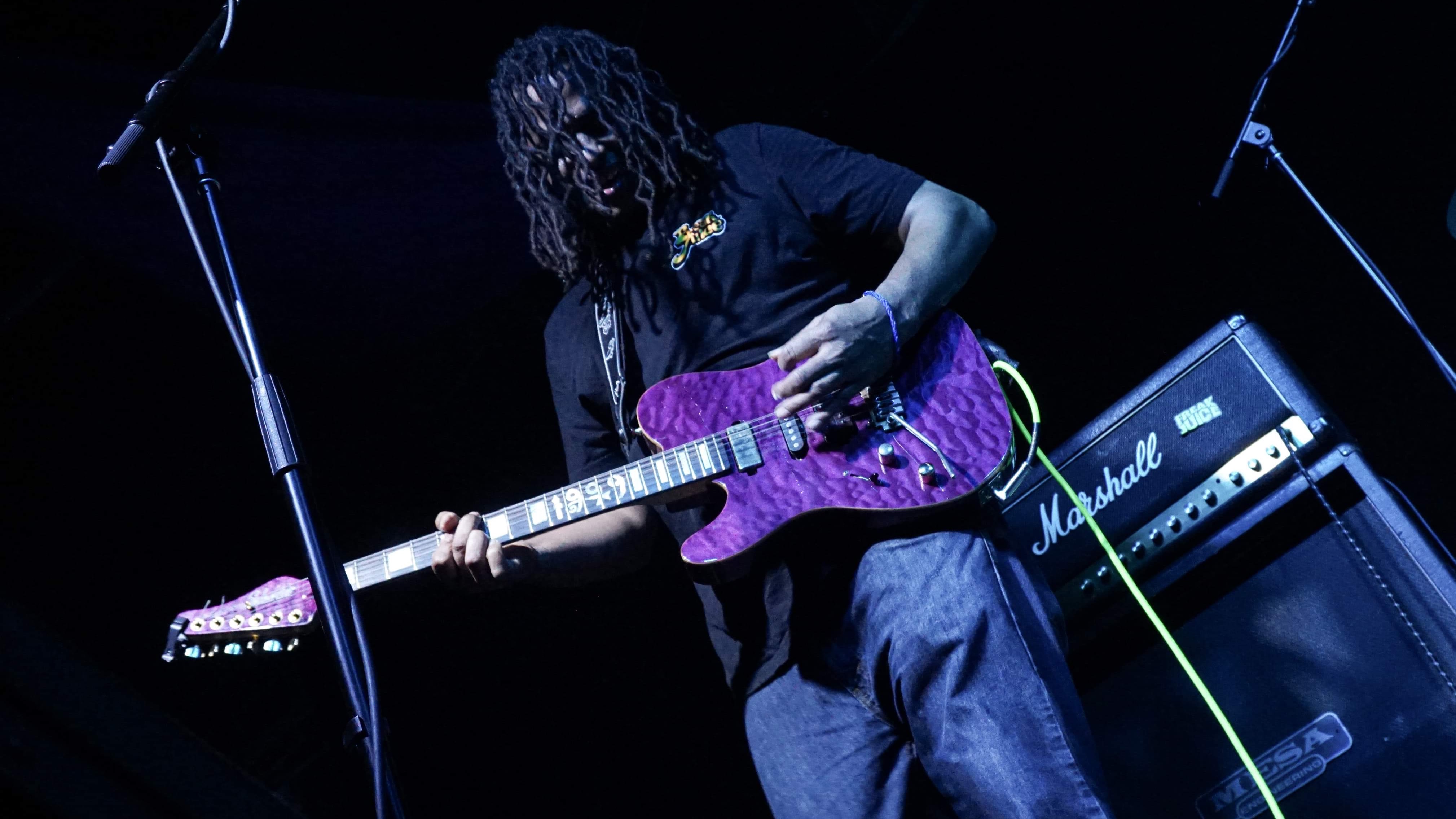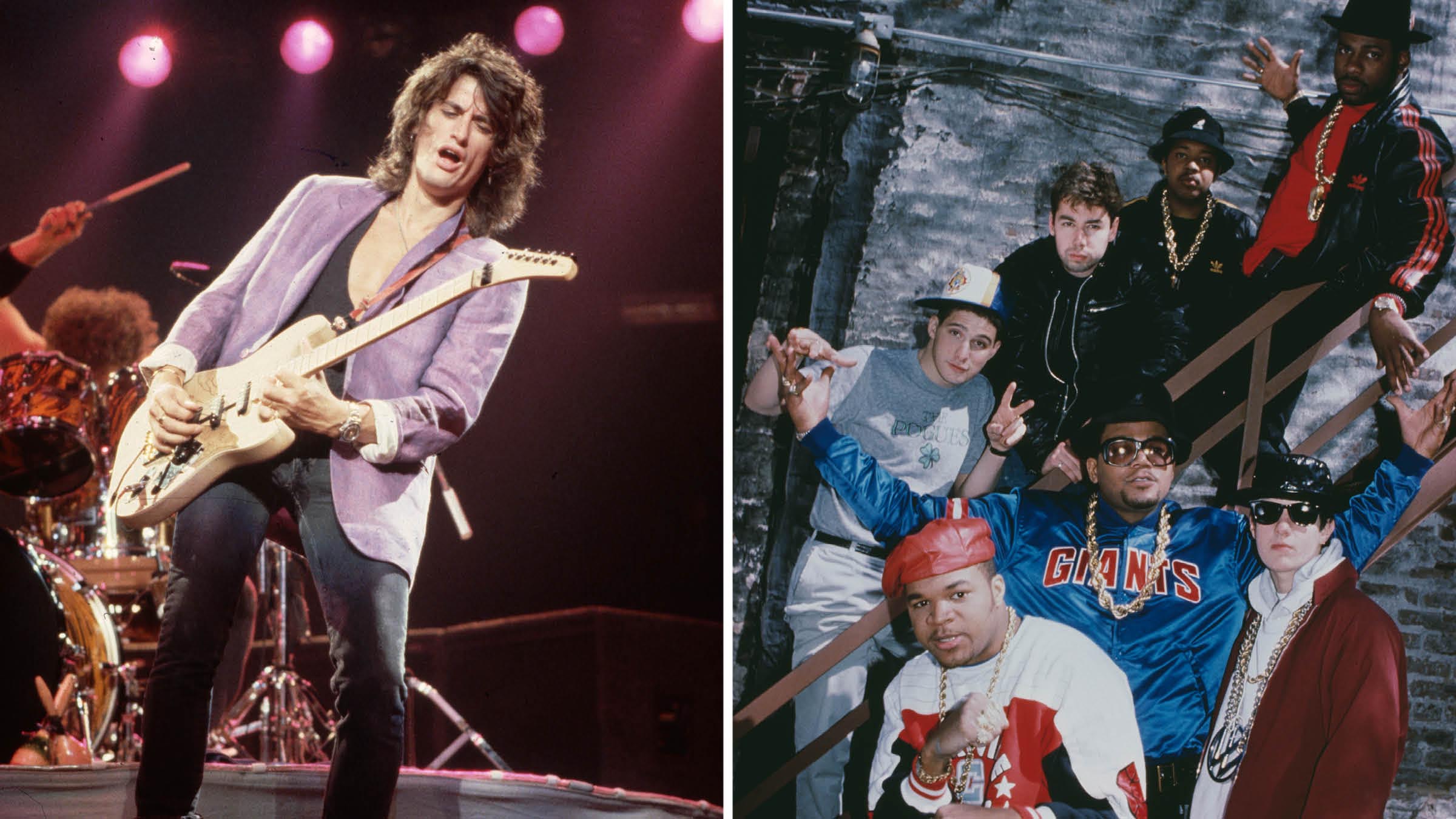Freak Juice's Tori Ruffin talks high-profile gigs with Prince and Morris Day, and backing Eddie Murphy in Coming to America
As funk-rock collective Freak Juice release new album, They Call Us Juice, Ruffin discusses how he ended up reprising his role in Sexual Chocolate for this year's Coming 2 America

All the latest guitar news, interviews, lessons, reviews, deals and more, direct to your inbox!
You are now subscribed
Your newsletter sign-up was successful
Tori Ruffin has served as the lead guitarist in Morris Day and the Time for roughly a quarter century, and along the way he’s also played with everyone from Prince, Michael Jackson and Mariah Carey to Mick Jagger, Lenny Kravitz and Fishbone. He even performed (poorly, on purpose – more on that later) in the classic 1988 Eddie Murphy comedy Coming to America.
In addition to his high-profile work with other artists, the Oklahoma-based musician also leads his own band, Freak Juice, which meshes funk and R&B with his love for riff-heavy hard rock.
And while the band’s new album, They Call Us Juice, is pretty hard to pigeonhole – it runs the gamut from the thick guitar grind of opener Better to the throwback r&b of Learned It From U, the acid-tinged instrumental jazz of Billy Ann’s Jump to the extended fusion-funk workout Pimp Bus – Ruffin is willing to give it a shot.
“People like labels, so if you had to label it something it would be, like, 'Miles Davis meets the Deftones or Led Zeppelin,'” he says. “It gets heavy sometimes, and then we improv a little. And where Zeppelin had more of a blues-based jam in their thing, I'll maybe play altered chords in a way that Miles would in his electric band.”
Ruffin recalls a particularly life-changing moment in his musical education: “I was really influenced by Miles’ band with Mike Stern and John Scofield that he took out in the ‘80s. When I was a kid at 17, I saw them at the Hollywood Bowl and they were rocking their butts off, but then they would launch into this other stuff and I was like, ‘What is that?’”
He laughs. “And somebody said to me, ‘Tori, that's bebop.’ And I said, ‘Oh shit! That's what I want to do – I want to rock and play some bebop! But in a Led Zeppelin band!’ And that's kind of what Freak Juice is.”
Ruffin sat down with Guitar World to talk about his wild career, from Prince to Morris Day to Eddie Murphy, as well as, of course, “making the juice” with Freak Juice.
All the latest guitar news, interviews, lessons, reviews, deals and more, direct to your inbox!
You touch on so many different styles on They Call Us Juice, but it’s clear that the core of what you do lies in the intersection of funk and R&B with heavy guitar rock. Who are your primary influences?
“I come from an era and a time where Stevie Wonder and Led Zeppelin and Elton John and James Brown were all on the same radio station. That's how far I go back. And so as a child I loved it all, man. I embraced it.
“I'm originally from Detroit, and it’s like, we were playing James Brown and the Isley Brothers, but Rush was right across the street in Canada so we were also learning Rush tunes and Led Zeppelin and of course Jimi Hendrix.
“And then as I got older I went to LA and became a professional musician, and you had Prince on the scene, and he was pretty rocking. He mixed all these styles. So we started to see it happening.”
How did Freak Juice come together?
It’s one thing to be technically proficient, but, you know, BB King didn’t play a bunch of notes, man. But that one note he did play spoke to millions
“When I would tour with Morris Day, it was one thing – it was funk and it’s really specific. And I love it because it teaches you a certain discipline. But when I would get off the road, I had all these other musical lives and experiences that I wanted to get out of me and play. So I put together Freak Juice and we just play all these genres.
“Because people know me as an R&B musician, they automatically assume that's what Freak Juice is. And while there are those influences, I would say it's more of a rock band than an R&B band. I’m not an R&B crooner at all, you know?
You mentioned Prince earlier. You had the opportunity to play with him.
“I'm on a couple of recordings with him that I hope come out one day. He would come onstage with Morris and we would play. And we’d be in the studio a bit, too. I never actually toured in his band, but I had some interaction with him onstage for sure.”
Being so close to him, what would you say was his truest talent as a guitar player?
“Just his ability to speak on the instrument and touch people. That's what any guitarist really hopes for. I mean, it’s one thing to be technically proficient, but, you know, BB King didn’t play a bunch of notes, man. But that one note he did play spoke to millions.
“That was Prince's true genius. He might not know how to play over a D7b9 chord... or, he probably did. But what I mean is he might not have known the technical part of that, but he spoke to millions.
“Another thing is I didn't realize what a great acoustic player he was too, because on that [2004] Musicology tour [on which Morris Day and the Time served as a support act] he sat down onstage with an acoustic and it just blew my mind. It was my favorite part of the show.”
I would imagine playing with Morris Day is a pretty great gig. It must be so much fun to play songs like Jungle Love and The Bird every night, and judging from live videos I’ve seen, Morris really allows a lot of space for the guitar to shine.
“Oh yeah, he lets me go. But you know, when I first got the gig it was in the ‘90s, there were still plenty of gigs to be had as far as R&B. And when you're in a gig for a while you start thinking, 'Man, this is great, but maybe there’s something else I wanna do.'
“Then I had the chance to go out with Mariah Carey and some other people and I said to myself, 'They're going to be out on the road maybe six months, maybe a year at a time.' But with Morris, he's out all the time, and I’m actually getting to play a lot of guitar.
“I started thinking, as far as R&B gigs go, especially knowing where I come from as a rocker, this is probably the best thing I could ever hope for. I'm up front, I'm part of the band. He lets me play. And the money's on time.”
What more could you ask for?
The juice is the music and freak is what we like to do to it
“Yeah. So it's been 26 years. And there's no plans to slow down, either. We're gonna get back out there eventually and keep doing it.”
You refer to Freak Juice’s music as “the Juice”. What does that mean, exactly?
“I know you guys are familiar with [session musician] Michael Landau. We're buddies, and back in the day we’d all go and hang out at [LA jazz club] the Baked Potato. His brother [Teddy Landau] was in Freak Juice, too, and we would all call each other juice makers. 'Hey, let's go make some juice!' And I just kind of adapted that. So the juice is the music and freak is what we like to do to it. We'll do anything and everything to the music that we like to do. There's no boundaries.”
What gear are you using on They Call Us Juice?
“Schecter has been building me guitars and I play a lot of their PTs. For this record, they built me a PT that has a really hot pickup in the bridge called the Apocalypse. Then I had them put a mini-humbucker in the neck and a single coil in the middle. So I get a really diverse tone. My guitar can sound like a jazz box one minute and then it can stun you with that Apocalypse. And it can get funky, too.”
How about amps?
“I have a dual-channel Marshall JCM800 and a Mesa/Boogie Triple Rectifier. I remember I was mic'ing up the amps…and then came my [Fractal Audio] Axe-Fx II. [laughs] I started comparing the signals and doing the IRs and pretty soon there were no mics on the cab and I finished the record with the Axe-Fx. And I challenge anybody to tell me which is the Axe-Fx and which is the real amps. Because I can’t hear the difference. And if there is a difference, I know people listening to the record can't hear it.”
You’ve played with a lot of artists over the decades, but one of your most well-known gigs was appearing as part of the band Sexual Chocolate in the 1988 Eddie Murphy/Arsenio Hall comedy Coming to America. And you’re also back for the new sequel.
“We got the call at the last minute. We thought, 'It’s been 30 years, they're probably going to have a younger Sexual Chocolate.' But we ended up being in the movie and it was a lot of fun. And it was most of the original guys.”
What song do you play in the movie?
We get in the studio and start playing and the producer says, 'Cut!' He goes, 'You guys gotta sound like a horrible lounge band – I want bad notes'
“We do We Are Family, the Sister Sledge song that Nile Rodgers wrote.”
In the original film, Sexual Chocolate performed Greatest Love of All, with Eddie’s character, Randy Watson, singing.
“Yeah. Here’s a funny story – we got to the set and they said, 'You guys are going to be recording Greatest Love of All.' So we rehearse it, we play this thing and we got it nailed note-for-note. We're ready.
“We get in the studio and start playing and the producer says, 'Cut!' He goes, 'You guys gotta sound like a horrible lounge band – I want bad notes.' He tells our sax player, 'You play the sax like you're just learning it.' So that was kinda funny. And then once we got on set, it took us two days to film it because Eddie was just cracking jokes.”
That must have been a trip.
“Oh, yeah. This is the young Eddie Murphy, man, and he was having a good time. I wish they would make an outtakes reel. That would be like a Netflix comedy special. I’m telling you, he had us on the floor for about four hours. It was great.”
Rich is the co-author of the best-selling Nöthin' But a Good Time: The Uncensored History of the '80s Hard Rock Explosion. He is also a recording and performing musician, and a former editor of Guitar World magazine and executive editor of Guitar Aficionado magazine. He has authored several additional books, among them Kurt Cobain: Montage of Heck, the companion to the documentary of the same name.

